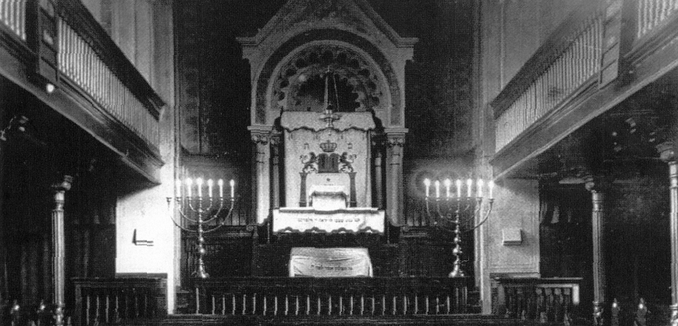A regional court in the German city of Wuppertal upheld a lower court’s ruling that a 2014 firebombing of a synagogue was not an anti-Semitic incident, but a way to criticize Israeli policies, Benjamin Weinthal reported in The Jerusalem Post on Thursday.
Three German Palestinians were convicted in 2015 of attacking the Wuppertal synagogue with Molotov cocktails in July 2014, when Israel launched a military operation to stop ongoing Hamas rocket fire against Israeli towns. The local court panel said in its decision that the firebombing was not motivated by anti-Semitism, but sought to bring “attention to the Gaza conflict.”
The three men — 31-year-old Mohamad E., 26-year-old Ismail A., and 20-year-old Mohammad A. — were issued suspended sentences. According to the court, they launched the attack under the influence of alcohol. The resulting fire caused €800 (about $850) in damages, though no congregants were injured. Days before the attack, someone spray-painted “Free Palestine” on the wall of the synagogue.
The current Wuppertal synagogue was opened in 2002, after its predecessor was burnt down by the Nazis during Kristallnacht in 1938.
Leonid Goldberg, the chairman of Wuppertal’s Jewish cultural association, told Deutsche Welle after the 2015 trial that the attack “was pure anti-Semitism. There were more than enough signals last July. All demonstrations were against Israel – and not just against Israel, against Jews. It was just a matter of time, that this atmosphere would produce attacks against a Jewish house of worship.”
“For years now, our rabbis haven’t worn their kippahs in public as they go through Wuppertal,” Goldberg added. “Jews that do wear their kippah in public attempt to hide it by wearing a hat on top so that they don’t have to hear insults from young Muslims, most of all.”
Volker Beck, a leading Green Party MP, also disputed the court’s decision in 2015, saying that the “attack on the synagogue was motivated by anti-Semitism.”
“What do Jews in Germany have to do with the Middle East conflict? Every bit as much as Christians, non-religious people or Muslims in Germany, namely, absolutely nothing. The ignorance of the judiciary toward anti-Semitism is for many Jews in Germany especially alarming,” he added.
In The Global Pogrom, which was published in the August 2014 issue of The Tower Magazine, associate editor Benjamin Kerstein observed that the summer war between Israel and Hamas had led to a dramatic increase in anti-Semitism:
Genocidal rhetoric was not confined to Belgium. It also appeared in, of all places, Germany. One would have thought that, in the post-Shoah age, Germany had lost the right to allow such things to occur. But this was not the case. A report from the Times of Israel states, “In Dortmund and Frankfurt anti-Israel protesters chanted, ‘Hamas, Hamas, Juden ins gas!’ (‘Hamas, Hamas, Jews to the gas!’). On Friday, a 200-strong mob in Essen chimed in, ‘Scheiss Juden!’ (‘Jewish shit’).”
In Berlin, once the seat of the Nazi regime, “An angry mob gathered” to spew language that would have enchanted the late Fuhrer. “Draped in Palestinian flags and shaking their fists in rage, they chanted in German, ‘Jude, Jude feiges Schwein! Komm heraus und kämpf allein!’ (‘Jew, Jew, cowardly swine, come out and fight on your own!’).”
[Photo: WikiCommons ]




